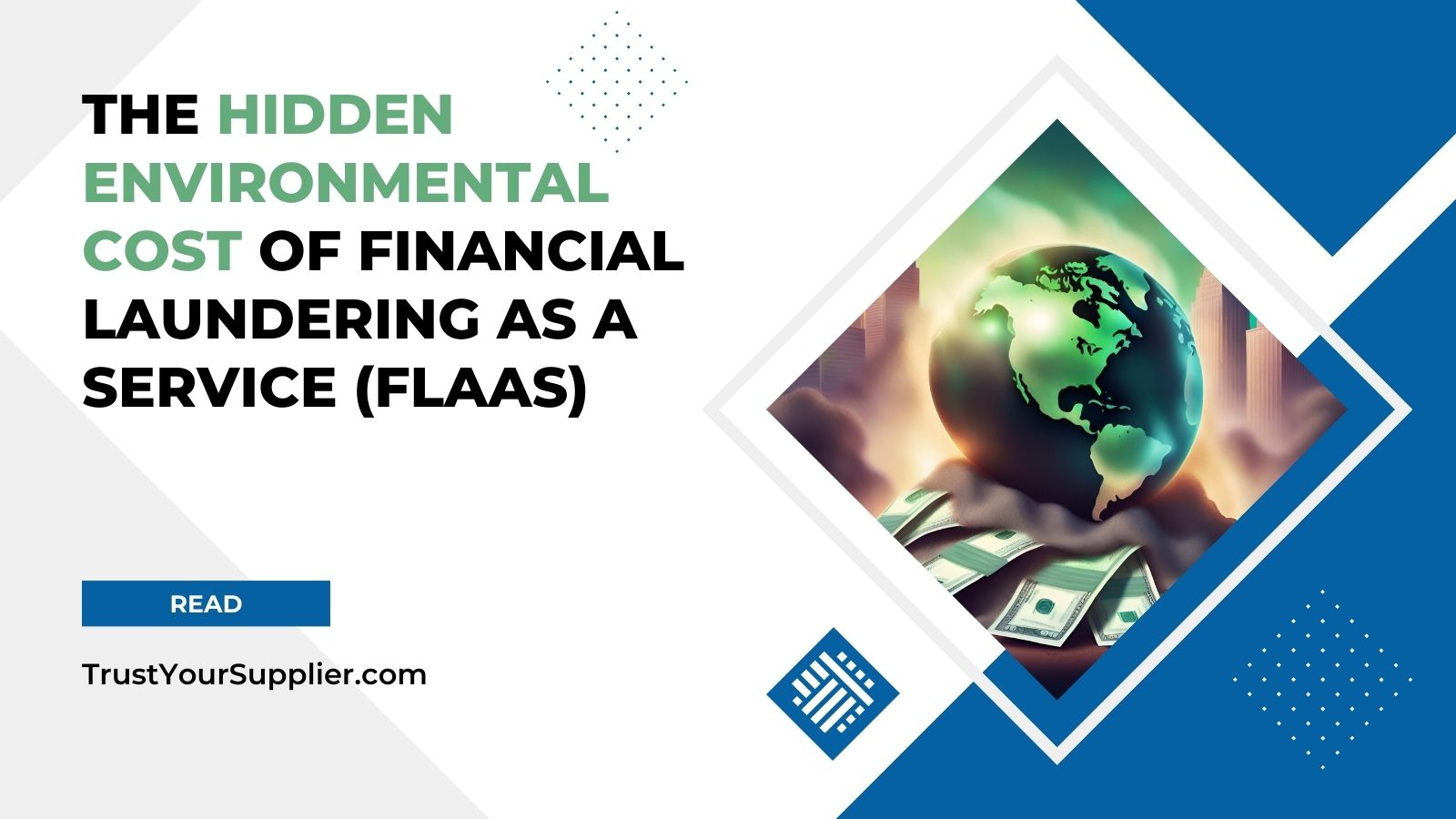by Michelle Armstrong, TYS Global VP of Value Solutions Consultant
In the digital age, the “as a Service” model has revolutionized how we access technology, from software to infrastructure, making it easier and more efficient for businesses and consumers alike. However, this model’s darker iteration, Financial Laundering as a Service (FLaaS), poses significant challenges not just to the global financial system but also to environmental sustainability efforts, particularly in managing Greenhouse Gas (GHG) emissions. While the connection between financial laundering and environmental degradation might not be immediately obvious, the ripple effects of FLaaS can undermine global efforts to combat climate change in several ways.
Diverting Crucial Resources
The fight against FLaaS requires substantial financial, technological, and human resources. Governments and businesses must invest heavily in detecting, preventing, and prosecuting financial laundering activities. These resources could otherwise be allocated to renewable energy projects, conservation efforts, and the development of low-carbon technologies. The diversion of such resources compromises the effectiveness of GHG management initiatives, delaying progress in the transition to a sustainable and low-carbon economy.
Undermining Regulatory Frameworks
Financial laundering is often linked with environmental crimes, such as illegal logging, wildlife trafficking, and unregulated mining. These activities directly contribute to GHG emissions and are driven by the profitability enabled by laundering illicit proceeds. FLaaS, by facilitating easier and more accessible financial laundering, can exacerbate these environmental crimes. It undermines regulatory efforts aimed at promoting sustainability and holding businesses accountable for their environmental impact, making it more challenging to enforce laws designed to reduce GHG emissions.
Impact on Corporate Governance and Investment
The involvement of any business in FLaaS, directly or indirectly, can lead to significant reputational damage. This undermines corporate social responsibility (CSR) efforts, including commitments to environmental sustainability and GHG emission reductions. Furthermore, the opaque nature of financial flows resulting from FLaaS can lead to investments in industries with high GHG emissions, rather than in clean energy and green technologies. Strengthening anti-money laundering (AML) measures can redirect investments toward sustainable initiatives, promoting environmental stewardship and reducing GHG emissions.
Economic Stability and Environmental Policy
A stable and transparent financial system is foundational to effective environmental governance and the implementation of GHG management policies. Financial laundering, particularly through FLaaS, threatens this stability, potentially corrupting the political processes essential for environmental policy-making. The destabilizing effect of laundered money can impede the allocation of public funds to critical environmental projects and weaken international cooperation on climate change mitigation.
The Path Forward
Combating FLaaS is not just a financial imperative but an environmental necessity. Strengthening AML measures, enhancing international cooperation, and fostering transparency in financial transactions can mitigate the adverse effects of FLaaS. By ensuring that financial systems are not exploited for laundering activities, we can secure the resources and stability needed to address GHG emissions effectively. Investments can be channelled into sustainable industries, driving innovation in green technologies, and supporting the global transition to a low-carbon economy.
Trust Your Supplier (TYS) stands as a critical tool in the arsenal against the environmental degradation exacerbated by FLaaS. By leveraging blockchain technology, TYS provides a secure and transparent platform for managing supplier information, ensuring that data integrity is maintained across the supply chain. This level of transparency is vital in identifying and mitigating the risks associated with suppliers that may be involved in environmental crimes or lack proper compliance with environmental regulations. Through comprehensive MDM capabilities, TYS allows companies to maintain an accurate and up-to-date repository of supplier data, including their environmental compliance records. This data can be instrumental in making informed decisions about which suppliers to engage with, prioritizing those that adhere to sustainable practices and contribute positively to GHG management efforts.
TYS’s robust risk and compliance monitoring features enable businesses to proactively assess and manage the environmental risks associated with their suppliers. By setting criteria for compliance with environmental standards, TYS can help flag suppliers that fall short of these benchmarks, allowing businesses to take corrective action before any reputational or regulatory consequences arise. This is particularly relevant in industries prone to high GHG emissions, where selecting environmentally responsible suppliers can significantly contribute to a company’s overall sustainability goals.
In the battle against FLaaS and its indirect facilitation of environmental harm, Trust Your Supplier emerges as a potent solution to ensure that businesses do not inadvertently support activities contributing to GHG emissions. By fostering a more transparent, compliant, and sustainable supply chain, TYS not only aids in the fight against financial crimes but also aligns with global efforts to mitigate climate change. This dual function underscores the importance of integrating advanced supplier management tools like TYS in strategic efforts to secure a sustainable future, making it clear that the fight against financial laundering is inextricably linked with the broader struggle for environmental sustainability.



0 Comments